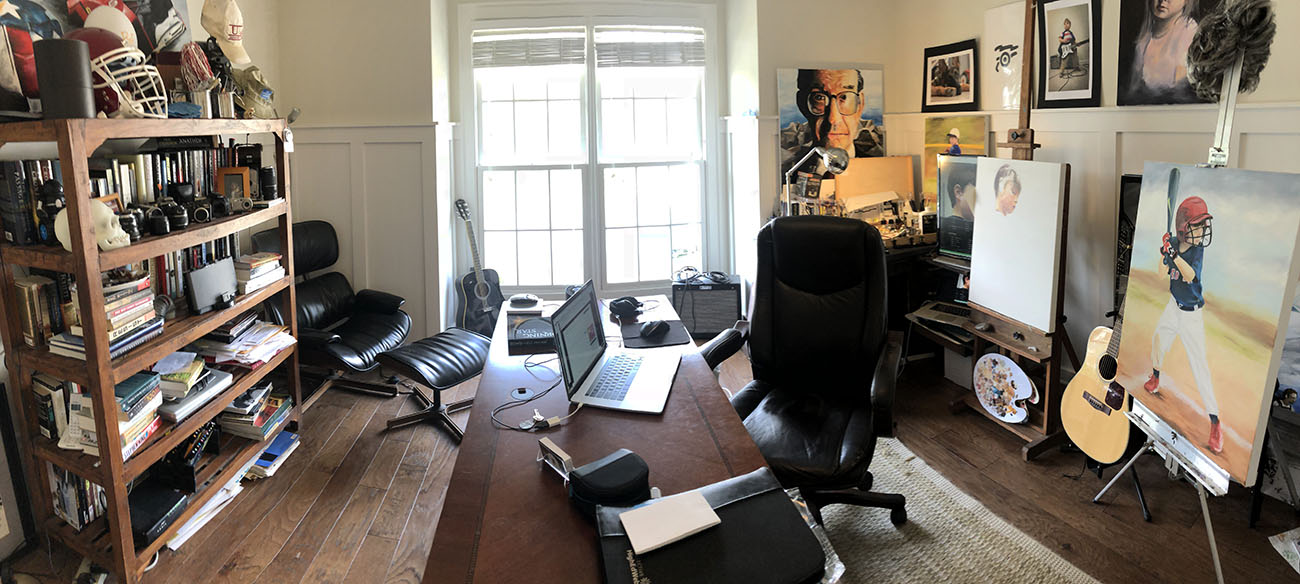How To Be Creative (a post about the creative process)
When I was a kid I liked to draw. I thought it meant I was creative. My grandparents told me I was. I believed them. So I kept at it. And by the time I was 23 I was already in a position of some creative responsibility at a 100 million dollar ad agency (think the southern version of Mad Men). Applicants for new creative positions would come across my desk and inevitably half of them — normally the crappy half — would say something like “I’ve been drawing since I was a kid.”
No one cares that you drew pictures when you were 10 years old. The same applies to writing. My favorite author started in his 30s. When you “started” doesn’t make you creative. All that matters is how great you are today. Your ability to create something unique, that makes people think or at least surprises them, makes you creative. And being able to critique your own work is even more important.
So how do you get there? How do you know you’re creative?
I do a lot of design work in my day job. A couple of weeks ago I was failing at coming up with an acceptable creative execution. The client, a different kind of designer, but a creative none-the-less said, “It’s ok. I know you don’t have formal training in design…”
I was stunned into silence. I have a studio art and design degree. I landed my first professional design gig at a very creative firm at 18. I had my first copywriting gig at 20. I’ve been in a creative position of some kind for 22 years. I’ve had long term creative projects for fortune 500 companies. Yet for this particular project, I had obviously failed so badly that the client thought I had no formal training. Sadly I actually know why. And I’ve been around more than long enough to know better. I didn’t think enough about it.
I didn’t meditate on it. I didn’t stare at it. I didn’t LAYER my process. I’ll get back to what I mean by layering in a moment. I’d made assumptions about what was acceptable and I’d set the bar too low. To be clear, I’d not failed to meet my own expectations for that project. In truth, many, if not most, of my clients would have loved what I’d produced. But this person could see a lack of polish and her expectations were higher than mine. I felt exposed. She didn’t care that I’d been drawing for four decades. All she saw was me at my status quo. This project had another very specific creative handicap that was not my fault. But I could still see how I’d made it worse.
Creative passion is not daydreaming. It’s action.
I’d argue that MOST “creative” folks, other than the most passionate, are falling into that same trap. And most tragic is that many start there and never even aspire above it. Admittingly my personal interests have switched lately and my professional work is good enough for 95% of my clients. So, unfortunately, I’ve probably been on autopilot too much with my day job. But I’ve continued to improve in many of my other creative pursuits. So I’m not a complete loser.

So what does any of this have to do with sci-fi writing?
If you asked me today what I’d love to be best at, and do forever, I’d tell you that it’s to write. I’m 39. I’ve got time. So I spend a solid hour per day on my writing. It’s not a natural talent of mine. And I don’t think I’m particularly great at it yet. But if nothing else, 20 years in the creative advertising world has thought me to be quick on me feet when it comes to brainstorming and ideas. The rest is just trying to improve on the things I’m not great at.
So here’s my entire creative process when writing.
0. Consume creative works.
I made this item zero because you should be consuming good creative as much or more than you’re trying to create it. This will help you be a much more effective critique. If you’re trying to be a writer but you don’t read every day, you are doing it wrong. I read an absolute minimum of 15 minutes of fiction per day. Besides eating, sleeping and going to the bathroom, it might be the only thing I do every day.
1. Get a routine for your creativity.
In my first copywriting gig I would actually work afternoons at a small ad agency while in college. Every day, at the same time, I walked into that agency, sat at my desk in the corner, and worked. It was a routine and it worked. At 21 years old I was contributing to award-winning ideas.
2. Quiet your mind.
I need to be at peace to write. I honestly think I’m getting better because as I’ve gotten older I worry less. But I get into my happy place mentally. This literally takes sitting still, closing my eyes, and taking a breath sometimes. Two minutes of quiet meditation goes a long way.
3. Brain dump (I like to think of it as freestyle thinking).
Once I’m in that quiet place, I let my brain wander. I write in a free-flowing thought process not questioning if something is good or not. This is not the time to judge those things. That’s why some ideas on this website are terrible and the one right behind it might be super cool. I don’t judge my creativity when I’m in this mode.
4. Think of everything in layers.
This is where my portrait painting background serves me well. The photo above is of my home office. It also doubles as my painting studio. Portrait painting is all about layering. An oil portrait’s first layer looks nothing like the final product. With every layer, it gets better. So once you have an idea you want to run with, don’t get discouraged on the first, second or even third draft. Work the idea, mold it, and keep going. This is the time to really think about what you’re creating.
5. Leave it.
Step away from it. Maybe for a day. Maybe for a week. If it’s a completed story or novel, maybe a month. Do something else in the meantime. Work on a different story or paint a picture. It will look a little different when you come back.
6. Come back to it.
This part is important. No matter how you initially feel, come back to it. I’m 300 pages into my current novel attempt. If I’d given up after the first draft of the first chapter I wouldn’t be where I’m at.
7. Love it or move on.
After you’ve come back to it, if you just hate it, you might want to consider moving on. I was 250 pages into my last novel attempt when I shelved it. I don’t regret it. It was too complex of a story for where I’m currently at in my writing. My next attempt has proven to be far more rewarding.
8. Keep going.
If you’re still in love with what you’re doing, keep going on your edits. Keep molding. And start getting the opinion of others.
The most important thing I’ve learned whether it was learning to draw, paint, write, code or playing guitar, practice makes perfect. It’s a cliche. But it’s the truest cliche. I tend to see drastic improvement between projects. I think the exception to that is when your passion leaves. And that’s probably a topic for a different day.
Let us know what you think about our ideas! Comment below to give us your opinion, add onto an existing idea, or submit one of your own!










